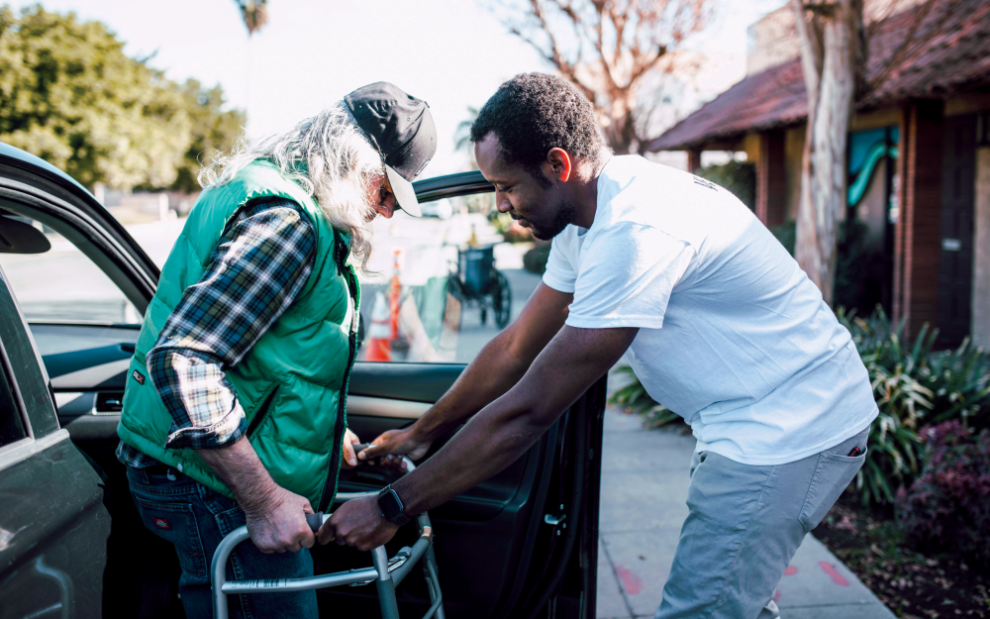We all make choices every day, and these choices mean we help some people and not others. And it is common sense (and our common practice) that we love more the people who are most closely united to us. A spouse or a child has a claim on our time and resources—on our active love, willing their good (“benevolence”)—that supersedes other claims. So, too, our coworkers, fellow parishioners, and friends. As Christians, we must also love every person made by God, but that is a matter of benevolence. Our will to love others can and should be universal; our actual loving never can be.
But why should we love those closest to us the most? Why should we prefer friends and family? Doesn’t Jesus demonstrate almost the opposite in his ministry? Doesn’t he ask his disciples to leave their families? Doesn’t he associate with the outsiders? Doesn’t he indicate that anyone can love their friends, but his followers love their enemies?
This is a complicated question that is poorly suited to bumper stickers or social media. As we consider the challenge of how to prioritize our active loving, we might notice three things.
First, the Second Vatican Council called everyone to live the fullness of Christian life. It abolished what John Paul II described as the “two-level ethic” in which some Christians lived out Jesus’ call to perfection, while others simply hit a minimum standard of “not sinning.” This “universal call to holiness” means that the heroism of Mother Teresa or Dorothy Day can’t simply be irrelevant for the rest of us. Jesus’ ministry and words call us all to some sort of gift of self to others.
Yet in any vocation, we must make choices about whom to love. Even Dorothy Day had to decide how to prioritize her love, and some people wonder if she did not always adequately balance her love for the poor with her role as mother of a child, Tamar. The will to love universally has to be converted into acts of love that are more particular. Insofar as Christ comes to redeem human life in the world and not dismantle it, the Catholic Church has always affirmed “natural loves” like marriage, friendship, and country.
As Pope Francis wrote in Fratelli Tutti (On Fraternity and Social Friendship):
There can be no openness between peoples except on the basis of love for one’s own land, one’s own people, one’s own cultural roots. . . . Everyone loves and cares for his or her native land and village, just as they love and care for their home and are personally responsible for its upkeep.
The pope is explaining that local and particular loves need not be opposed to universal love.
This brings us to our second point, what Thomas Aquinas tries to do in teaching an “order of love.” For Aquinas, we love more intensely what is closer to us (because it is natural) and what is better (because it’s closer to God). This is why, for example, I need to love myself prior to loving my neighbor. Still, Aquinas clarifies that we should not love our bodies more than our neighbors; indeed, he is quite clear that “as regards the welfare of the soul, we ought to love our neighbor more than our own body.”
We ought not to sacrifice our souls for others, but certainly, we can and should sacrifice our bodies for their good. This would include superfluous physical pleasures; as an expression of properly ordered love, we might go on a service trip instead of a fancy vacation or go to an inner-city parish on Saturday afternoon rather than relaxing in front of the TV.
Determining the order of love we follow is not a simple ranking of importance. When Aquinas asks whether it is better to love friends or enemies, he suggests we can consider this question in two ways. On the one hand, it is obviously good to love what is good; this means that from the perspective simply of who is being loved, we love friends more because of their goodness to us. However, from the perspective of why we are loving, Aquinas says loving our enemies is better because this love makes clear that our true basis for all loving is our love for God. We gain no “natural” reward from loving an enemy; indeed, sometimes we gain the exact opposite. But our treasure is great in heaven. And, in addition, as witnessed so often in the gospel, love of enemies can result in reconciliation.
Aquinas is not artificially making things complicated here. He is trying to make sense of two aspects of Christian life that all of us must combine: the natural loves fitted to our finitude and the supernatural love of God that stretches to the ends of the Earth and even beyond death. We must combine those, not pit them against each other.
In a sinful world, we constantly experience these matters as conflicting. For example, migration almost always happens against a backdrop of sin: the sins of corruption and injustice that create social chaos in home countries, the sins of avarice and luxury in rich countries, the sins of those who take advantage of vulnerabilities on both sides to traffic drugs or people.
“Both Jesus and the Catholic social tradition give us one direct command: Help those who are suffering.”
How then do we express divine love in this complicated situation? The dilemma is not easily resolved. Indeed, the desire to answer questions like this easily may be the best way to perpetuate them.
We must not forget a simple final point. In combining the natural order of human love and God’s infinite love, both Jesus and the Catholic social tradition give us one direct command: Help those who are suffering. Do not leave them by the side of the road. When Jesus answers the question about “who is my neighbor?” he responds with the story of the Good Samaritan, which is about “being neighbor” when suffering directly confronts us.
Jesuit Father James Keenan rightly notes that sin is ultimately a “failure to bother to love.” We are most convicted of that failure to love when the urgent need is right in front of us. Consider how easily and quickly people respond to their community’s natural disaster or a sudden sickness in a parish: The suffering is seen and the suffering is met.
Christians must respond in that way to the world as a whole, rather than simply ignoring or hardening themselves against suffering.
What does this mean about the order of love? Because of modern communications media, a lot of suffering confronts us daily. We must make choices about how to help. But if we simply retreat from that suffering into the comforts of loving our own family, friends, and fellow citizens, we’re turning away from Christ as well.
This article also appears in the May 2025 issue of U.S. Catholic (Vol. 90, No. 5, pages 40-41). Click here to subscribe to the magazine.
Image: Pexels















Add comment